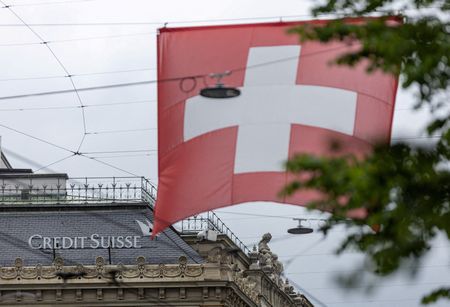 1
1 1
1
By Stefania Spezzati, Paritosh Bansal and America Hernandez
(Reuters) – Qatar’s sovereign wealth fund, Credit Suisse’s second-largest investor, has explored seeking redress for losses incurred by the bank’s takeover, two people familiar with the matter said, as legal challenges to Switzerland’s state-backed rescue mount.
The Qatar Investment Authority (QIA) sought legal advice on whether it had any claim against Swiss authorities, including through international arbitration, after Credit Suisse Group AG’s forced sale to UBS Group AG at a fraction of its market value, the two sources said.
The move by the $475 billion sovereign wealth fund to study legal options has not been previously reported. QIA stands to lose roughly $330 million on its equity stake in Credit Suisse as a result of the sale to rival UBS, Reuters calculations show.
Shareholders of Credit Suisse and UBS were not granted a vote on the deal that was sealed over one weekend in March.
Switzerland and Qatar have a treaty that lays out a process to settle disputes. The fund tapped a law firm that specialises in international arbitration and has offices in London and Paris, the sources said.
The law firm’s mandate, however, remains in an exploratory phase and a claim is not being actively pursued at this time, according to the sources. One of the sources characterised QIA’s move as work done to inform management of what their options might be, rather than instructions to act.
Officials for QIA, UBS, the Swiss finance ministry and Credit Suisse declined to comment.
QIA’s investment in Credit Suisse dates back to the global financial crisis of 2008.
Initially seen as a likely beneficiary of the existential threat faced by many of its rivals at the time – including UBS – a catalogue of subsequent missteps by Credit Suisse management and scandals erased billions of dollars of shareholder value.
Offsetting the decline in the stock over the years, QIA received interest payments on Credit Suisse bonds that were part of its 2008 investment, leaving it with an overall gain, the source said.
The sovereign wealth fund had increased its stake in Credit Suisse to just under 7%, only trailing largest shareholder Saudi National Bank’s roughly 10% stake, according to a January filing.
Reuters could not determine when QIA might decide whether to pursue a claim.
LEGAL CHALLENGES
QIA’s interest in exploring its options shows how the aftermath of the shotgun merger is likely to play out over many months.
Hundreds of lawsuits have been filed over terms of the deal after Credit Suisse’s shareholders and bondholders were left nursing big losses.
More than 1,000 investors representing around a third of the bank’s Additional Tier 1 (AT1) bonds are suing the Swiss regulator after around 16 billion Swiss francs of such debt was written down to zero.
Shareholders will receive one UBS share for 22.48 Credit Suisse shares. Among them, Middle Eastern backers which own more than 20% of Credit Suisse face the largest hit.
In deciding whether it should bring a claim, Qatar would need to balance its losses and the chances of winning against the impact on its relationship with Switzerland.
Should the Qataris decide to move forward, they would have to file a notice of dispute to the Swiss government, according to the treaty signed between the Swiss Federal Council and the government of the State of Qatar. The parties then have six months to settle the claim “amicably”.
If no agreement is reached, the dispute can be escalated to the International Centre for Settlement of Investment Disputes (ICSID), an international arbitration institution established by the World Bank in the 1960s for legal disputes between international investors and states.
(Reporting by Stefania Spezzati in London, Paritosh Bansal in New York and America Hernandez in Paris; Editing by Elisa Martinuzzi, Kirsten Donovan)